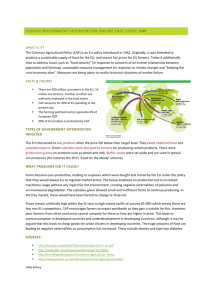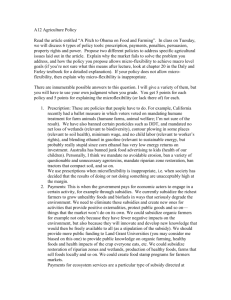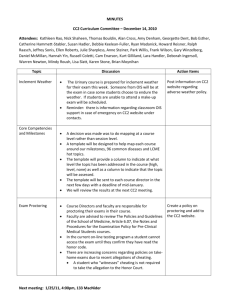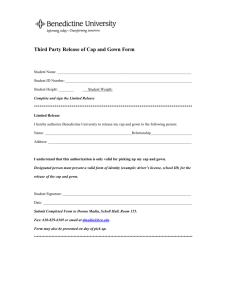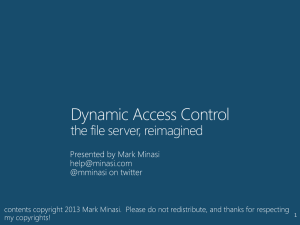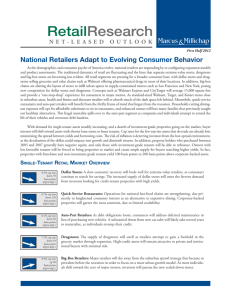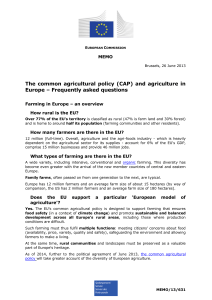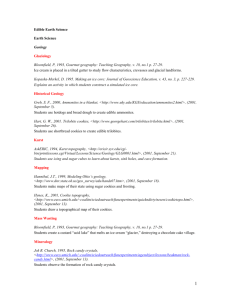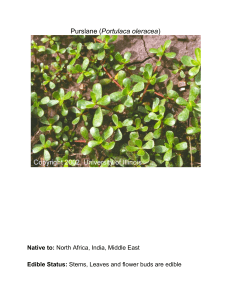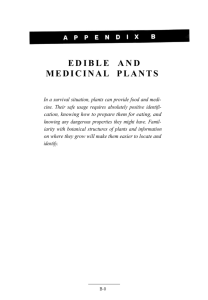DOC - Europa
advertisement
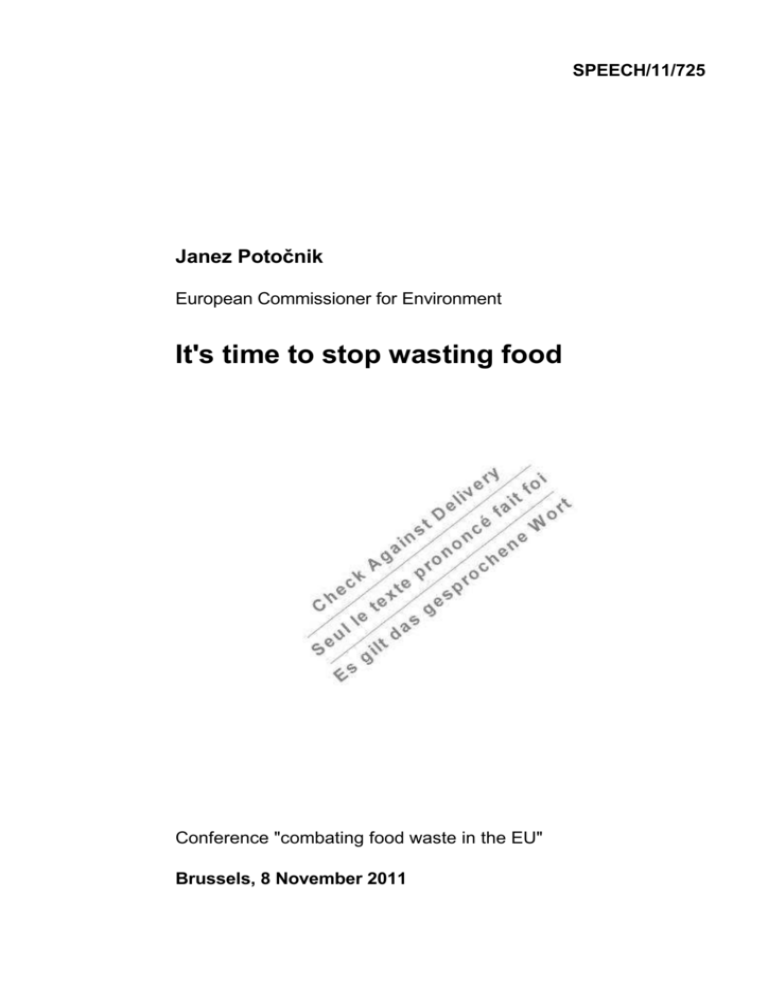
SPEECH/11/725 Janez Potočnik European Commissioner for Environment It's time to stop wasting food Conference "combating food waste in the EU" Brussels, 8 November 2011 Ladies and Gentlemen, We are facing a crucial challenge: our natural resources, water, metals, minerals, soils, land, ecosystems, biodiversity and others are under increasing pressure or under serious threat of degradation or depletion. Water use, for example, has increased nine fold in the 20th Century: if present trends continue, two thirds of the world population could be subject to water stress. So, our economy is putting unsustainable pressure on our planet. This means that we have to use our natural resources in a way that allows them to be replenished at the rate we consume them. We have to make the best possible use of resources available to us on Earth – learning to use them in an efficient and sustainable manner. So resource efficiency is a commercial imperative. Increasing competition for resources is inevitable in the coming decades, but this is not only a constraint. For those that are quickest to adapt and innovate – it will offer many new significant opportunities. We must grasp the opportunity to shift towards competitiveness and growth based on using fewer resources when we produce and consume goods and to create business and job opportunities from this new type of growth. The Roadmap to a resource-efficient Europe, which the Commission adopted on 20th September, outlines how we can achieve the resource efficient growth which is essential for our future wellbeing and prosperity. How we can decouple our growth from resource use and its impacts by 2050. The roadmap focuses on the three areas that together account for up to 80 % of the environmental impact of resource use: buildings, mobility, and …. food. Food: one of the main priorities of the Roadmap The food and drink value chain in Europe is behind 17 % of our direct greenhouse gas emissions and 28 % of material resource use. Our consumption patterns are having global impacts, in particular related to the consumption of animal proteins. It is a major user of high-quality water. At the same time, in the European Union alone, we waste 90 million tonnes of food every year or 180 kilos per person. Much of this food would have been suitable for human consumption. A combined effort is needed by farmers, the food industry, retailers and consumers to contribute to improving resource efficiency and food security at a global level. We must work towards resource-efficient production techniques, sustainable food choices and reduced food waste The Roadmap targets a reduction by 50 % of the edible food wastage in the EU by 2020. And that requires efforts from the whole food supply chain. Food waste: the role of business Businesses face many challenges to increase resource efficiency across the whole food value chain. - The manufacturing sector will have to increase use of its waste as by-products. - The Retail Sector will need to improve its stock management and selling methods to prevent products reaching their end-of-life before being sold. - The restaurant and catering sectors will need to manage their systems and services so as to reduce drastically their food waste losses - And, of course, consumers will have to be encouraged to find new ways of using edible food which they would otherwise throw away. Food waste: the role of consumers The consumer's role in preventing food waste is critical: Consumers throw away about 25 % of the food they buy, that is 76 kilos per person per year. That's about my own weight – well nearly! It would be an exaggeration to say that all food waste can be avoided: we can't eat bones or vegetable peel. But it is absolutely realistic to avoid at least half of those 76 kilos. The reasons why consumers waste edible food are diverse and include cultural attitudes, lack of knowledge of good conservation and storage practices, outsize portions, and lack of awareness about how to re-use leftovers. Misunderstanding of end-of-life dates alone appears to be responsible for about 20 % of the edible food wasted. Most people are simply not aware of how much they waste. 11 % of Europeans say they throw no food away, and 71 % think they throw away less than 15 % of the food they buy1. This highlights the importance of giving the right information to consumers. The European Commission is reaching out to address the issue of food waste in the "Generation Awake" Resource Efficiency Campaign which has just been launched. But all of you, retailers, manufacturers, suppliers of the food chain, have a role to play. Being the interface between suppliers and consumers, retailers are in a privileged position to bring information to consumers. Suppliers of the food chain must also help by providing written information on packaging and optimising prepacked portions. 1 Eurobarometer on "Attitudes of Europeans to the proper use of resource", February 2011. Food waste: existing legislation and initiatives That leads me to the different legislation and initiatives which already exist to tackle food waste: The Waste Framework Directive has established a waste management hierarchy which promotes waste prevention as the first objective, followed by re-use, recycling, and energy recovery, with disposal as the last resort. Member States are obliged to implement this hierarchy in practice, including for food waste. And they will have to tell us just how they plan to address food wastage in their National Waste Prevention Programmes due by 2013. To help them in this task, the Commission is preparing a guidance document on food waste prevention, on the basis of many existing best practice examples. This guidance will be published on our waste website shortly. The European Retail Forum for Sustainability, which is co-chaired and supported by the European Commission, is currently preparing an "Issue Paper" on waste minimisation, a large part of which will be dedicated to food waste prevention. The European Food Sustainable Production and Consumption Round Table has just agreed to address the issue of food waste prevention with recommendations for improving the use of by-products at production level and for raising consumers' awareness and information on the best ways to avoid wasting food. Private sector initiatives are essential to all elements of the resource efficiency agenda. And this is certainly applies to food. There are already some interesting private initiatives such as food-banks where donations come from retailers, who remove edible products from the shelves before the deadline for consumption, from distribution platforms, from food processors who provide unsold food or food that has packaging or labelling defects, from agricultural cooperatives, and from consumers. All these initiatives must be encouraged and broadened. Greening the CAP In the context of food production, I would like to mention the Commission's recent proposals to 'green' the Common Agricultural Policy. The Commission's recent CAP reform proposals are designed to ensure that all farmers receiving CAP payments contribute to providing environmental services. That they reduce the environmental impact of their activities, including wastes associated with food production. There are three farm level requirements involved in the CAP 'greening': - first, farmers with permanent grassland may not turn more than 5 % into arable land; this will help to avoid climate change as well as protecting soil and avoiding damage to biodiversity; - secondly, arable farmers must grow at least 3 crops on their farms – farmers undertaking monoculture will no longer be supported because monoculture is environmentally damaging and wasteful of resources; - thirdly, arable and permanent crop farms will need to dedicate at least 7 % of the farm area to ecologically useful features such as hedges, terraces, and buffer strips. These three new requirements will for the most part involve only modest constraints at farm level and they will create minimal bureaucracy; but they will deliver major environmental benefits at EU level because they will apply to almost all farms across the EU, and so cover most of Europe's land area. It is crucial that the Commission's proposals for 'greening' the CAP are supported by the Council and the European Parliament; as well as reducing food waste we also need to reduce environmental damage and the wasteful use of resources in the production of food in the first place. Some food waste occurs because agricultural production is seasonal, and abundant harvests of fruit and vegetables in particular can result in oversupply. Because oversupply can lead to market collapse, it is sometimes necessary to withdraw part of this production from the market to help growers manage these periodic crises. Where there is oversupply there is a helpful CAP scheme which encourages Member States to distribute some of this surplus fruit and vegetables to the most needy people in Europe via food banks, charitable and public service organisations. This can clearly contribute to reducing food waste at the production stage. **** Ladies and Gentlemen, Food waste is bad morally, it is bad economically and it is bad environmentally. Morally it is indefensible that France's leftovers could feed the Democratic Republic of Congo, and Italy's could feed Ethiopia's undernourished2. Economically, can you imagine the reaction you would get if you asked every household to put 565 Euros3 in the kitchen bin in cash? And that is without counting the cost of food wasted further up the chain, or indeed further down the chain in what we pay to remove the waste and dispose of it. But moral and economic issues aside, the environmental concerns around food waste are driving me to push for us to take our leftovers seriously. The environmental impact of food production is enormous, so the environmental costs of throwing away so much of that production are also enormous – and so avoidable. The high quality water used to irrigate the food we then throw away would be enough to supply many houses. The packaging used to wrap the food is also costly and needs managing as waste. The methane gas food waste produces traps 23 times as much heat in the atmosphere as the same amount of CO2 and about 30 % of the waste going to our landfills could be composed or processed to produce energy. Whatever starting point you take the conclusions are the same. Food waste is bad. As I am sure you will discover in your discussions at this conference, tackling that waste is complicated, it will take time and it will involve many actors, but tackle it we must. Thank you. 2 The U.N. World Food Programme. 3 Calculation of WRAP – Waste and Resources Action Programme (UK).
